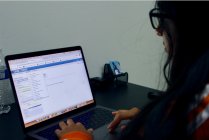During my time at UMBC, I have gotten to know many students who base their schedule on how the professors teaching the classes were rated on RateMyProfessor. I am now becoming one of them after too many unpleasant experiences with professors who were not the right fit for me.
When I searched the site for the professors teaching the classes I am currently taking, the comments and ratings for each professor varied greatly depending on the individual’s experience. Some of them were not listed on the website because students had not added them yet.
I was shocked to see numerous reviews that rated my environmental science professor “poor” as well as many that rated him as “good” or “awesome.”
Some were strongly in his favor: “I don’t know why [he] doesn’t have a better rating,” remarked one student, who gave the professor five points out of five. “I loved his class and think he is an awesome professor.” However, other reviews disagreed vehemently, with one warning students who enroll in the professor’s class to “ensure [you’re] well versed in the subject beforehand … you can improve your grade and trust me, you’ll need to. I escaped with a C.”
The more I perused the reviews, the more I found that both the positive and negative reviews made points that I would have found helpful when debating whether or not to take the class.
This is often the case with RateMyProfessor: regardless of the stance that the reviews take, they usually offer valuable insights into what students should expect. They often share information about the professor’s grading criteria, including whether or not attendance is graded, in what capacity the textbook is used for the class, and general characteristics of the professor, such as their personality and how responsive they are over lines of communication. These are valuable tidbits that can help students navigate the sea of professors when composing their class schedules.
Lily Hsu, a sophomore studying visual arts and secondary education, said that she exclusively uses the site “if [she has] problems with the teacher, just to see if [she is] the only one or if they’re consistent.” Such uses give students an alternative method to assess issues that they are having in a class if the professor’s methods or advice are not helpful.
Other students use RateMyProfessor to decide which professor they want to have if there are multiple teaching a course. Raychel Thress, a sophomore studying graphic design, said the site helps her narrow down her options. With so many professors and courses at UMBC, students often know little — if anything — about their professor before the class starts, RateMyProfessor can give students some insight about their potential instructor and whether or not it seems like they would be a good fit for one another.
By reviewing professors that they have already had, students are helping others who are considering the instructor decide on whether or not to enroll in their class. This function is useful because it can potentially decrease the number of students that change, drop, and possibly fail a class due to learning and teaching style disparities. With so many professors on campus, it is unrealistic to get a feel for each of them, but RateMyProfessor reviews posted by peers can move students closer to that ideal.


